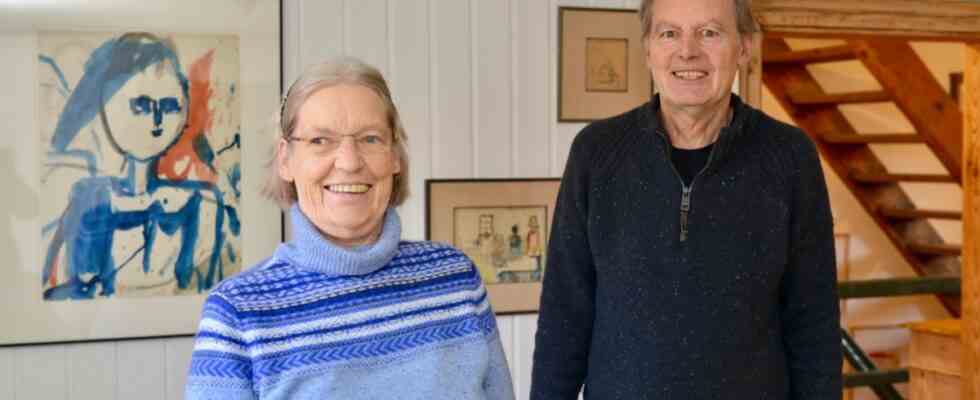Fathers and sons don’t always have it easy together. An anecdote told by Susanne and Axel Urschbach shows that the relationship can be tense. They are the children of Rolf Urschbach, their grandfather was Fritz Urschbach. The two artists, father and son, were in such a competitive relationship with each other that the father Fritz sometimes went there and without further ado painted his son Rolf in the picture he was developing.
Alex and Susanne Urschbach can laugh about it today; at a comfortable distance from their father and grandfather, they talk about their careers, their airs, their eventful lives. The two had more in common than they might have liked: both began to paint after World War I, one after the first, the other after the second, both had brief first marriages, and both first dealt with the figurative in their work , before turning to the abstract.
Up to 400 pictures are said to have been destroyed in the hail of bombs
Fritz Urschbach, who lived from 1880 to 1969, had, as his grandson Axel puts it, a lot of bad luck in his life as an artist. Trained as a merchant, after a few years of work he moved to the Academy of Fine Arts in Munich and later became a master student of Heinrich von Zügel, one of the most famous impressionists and animal painters of his time. During the Nazi regime, however, Fritz Urschbach’s art was ostracized as “degenerate”, some paintings were removed from museums and have not appeared to this day. His studio in Schwabing was also hit by bombs during the Second World War, and up to 400 of his works are said to have been destroyed.
Banned as a “degenerate artist”, Fritz Urschbach was not allowed to practice his art during the Nazi regime.
(Photo: Christian Endt)
Fritz Urschbach then lived with his second wife for ten years in Anzing with the Lohers, another family of artists belonging to the so-called “lost generation”. Later, as his grandchildren tell it, grandfather Fritz no longer really fitted in anywhere, rough and inflexible as he was.
Unlike his father, Rolf Urschbach, from 1922 to 2019, always had a day job that enabled him to support himself and his family. He also studied at the Academy of Fine Arts in Munich and exhibited in the Lenbachhaus and the Haus der Kunst. Sometimes he worked as a decorator, sometimes as an interior decorator, sometimes he designed a fashion collection. In 1954 he moved with his family to the Palatinate – to the homeland of his father, who stayed in Munich.
Small format, big effect: Rolf Urschbach never had a studio. His little works of art were all the more detail-loving.
(Photo: Christian Endt)
Rolf never had a studio, but always painted wherever it was convenient – in the study, in the basement, in the garden. It is mainly due to this fact that he always kept his works small. “Our father made something out of everything he could get his hands on,” says Susanne Urschbach. Her brother Axel remembers: And at dinner there was cheese wrapped in tinfoil, and it didn’t take long for his father to conjure up a duck out of the paper. Rolf Urschbach, who would have turned 100 this year, continued to paint into old age; Even when he was already seriously ill with dementia, nothing stopped him from drawing.
Rolf Urschbach painted into old age. This picture was taken in 2017, two years before his death, at the age of 95.
(Photo: Christian Endt)
Works by father and son are now being shown in an Ebersberg exhibition for the second time. For this purpose, the artist’s children and Annette Voith from the therapy house have joined forces: their mothers were best friends, all their lives. Now, after the death of Rolf’s wife Bobbi, parts of the artist’s estate are to be made accessible to a larger audience in a family show: the collection ranges from huge, colorful canvas paintings made by Fritz Urschbach’s brush to abstract landscape paintings by Rolf Urschbach.
Exhibition “Fritz and Rolf Urschbach” in the therapy house at Teacher-Schwab-Gasse 6 in Ebersberg, vernissage this Friday, November 18, at 6 p.m. Other viewing times are Saturday, November 19 and Sunday, November 20, and Saturday, November 26 and Sunday, November 27, from 11 a.m. to 6 p.m.

